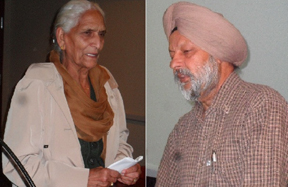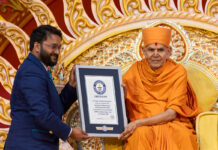
CHICAGO: Prominent Chicagoans from all walks of life gathered at the Palatine Public Library on March 30 to pay tribute to the acclaimed writer, columnist and public figure in India, Khushwant Singh, who passed away on March 20 at the age of 99 in Delhi.
A moment of silence was observed. Thakar S Basati, a prominent community activist, emceed the event. Professor S. Jagindar Singh Ramdev, President Punjabi Sabha, Chicago and Bibi Jasbir Kaur Saluja presided over the function. Rajinderbir Singh Mago, a well-known leader of Punjabi community, spoke about the fearless writings of Khushwant Singh. He mentioned that Khushwant Singh did not care about dressing up much. One time a peon won’t let him into his office because he didn’t look like an editor. “Only later when other employees came in and told him who this new editor was, the peon apologized.”
Bibi Surjit Kaur Gill read her poem, “Sayio ni mein tur jaana.” (My friends, I will be leaving). In the poem she recited how obliged she is for their friendship and how she feels leaving them behind after death. Surinderpal Singh Kalra, an office bearer of World Sikh Council, spoke about, “who should be considered a Sikh? Is it just the outlook or the work someone is doing for Sikhism.”
Khushwant Singh expressed his anger after Golden Temple attack in 1984 by returning Padma Bhusan, an award bestowed by Indian Government in 1983. Singh also was concerned about the increase in Patitpuna (cutting hair in Sikhs). His novel “Train to Pakistan” which was made into a movie won accolades from every corner of the world.
He wasn’t afraid of writing or supporting right causes. Nothing deterred him from speaking in favor of people who stood for truth like Joginder Singh, Editor & Spokesman Punjabi newspaper from Chandigarh and S. Gurbax Singh Kala Afgana who were fined by Akal Takhat Jathedaars. Khuswant Singh took their side. Mat Singh Dhillon, member of Punjabi Sahit Sabha, Chicago dedicated his poem, “Writer” to Khuswant Singh.
Sajid Chaudhry, a well-known Punjabi writer, poet from Lehnda Punjab, Pakistan, and co-organizer of Milaap in Chicago dedicated his few Punjabi couplets in his memory. One was, “Joun gadiya fal kanak na aave, bhujia bi na jamme, (you reap what you sow.)
Although some Sikhs didn’t consider him a true Sikh follower, but his book on Sikhi, “History of the Sikhs” is regarded the best book about Sikh history. It is used as a reference book. It took him three years to write when he was at Aligarh University. His translation of Shri Japji Sahib is the best so far in English.
Some of his books were displayed during the ceremony. At the end of the program, Thakar Basati thanked the audience and speakers and requested not to judge people.
As they say, “Don’t judge a book by its cover, same way we should respect people for what they stood for what they did and what difference they made in people’s lives. There is no way we can pay back what all these great people like Khushwant Singh, Maharaja Ranjit Singh or Sardar Bhagat Singh did for their people.”
Harish Rao






